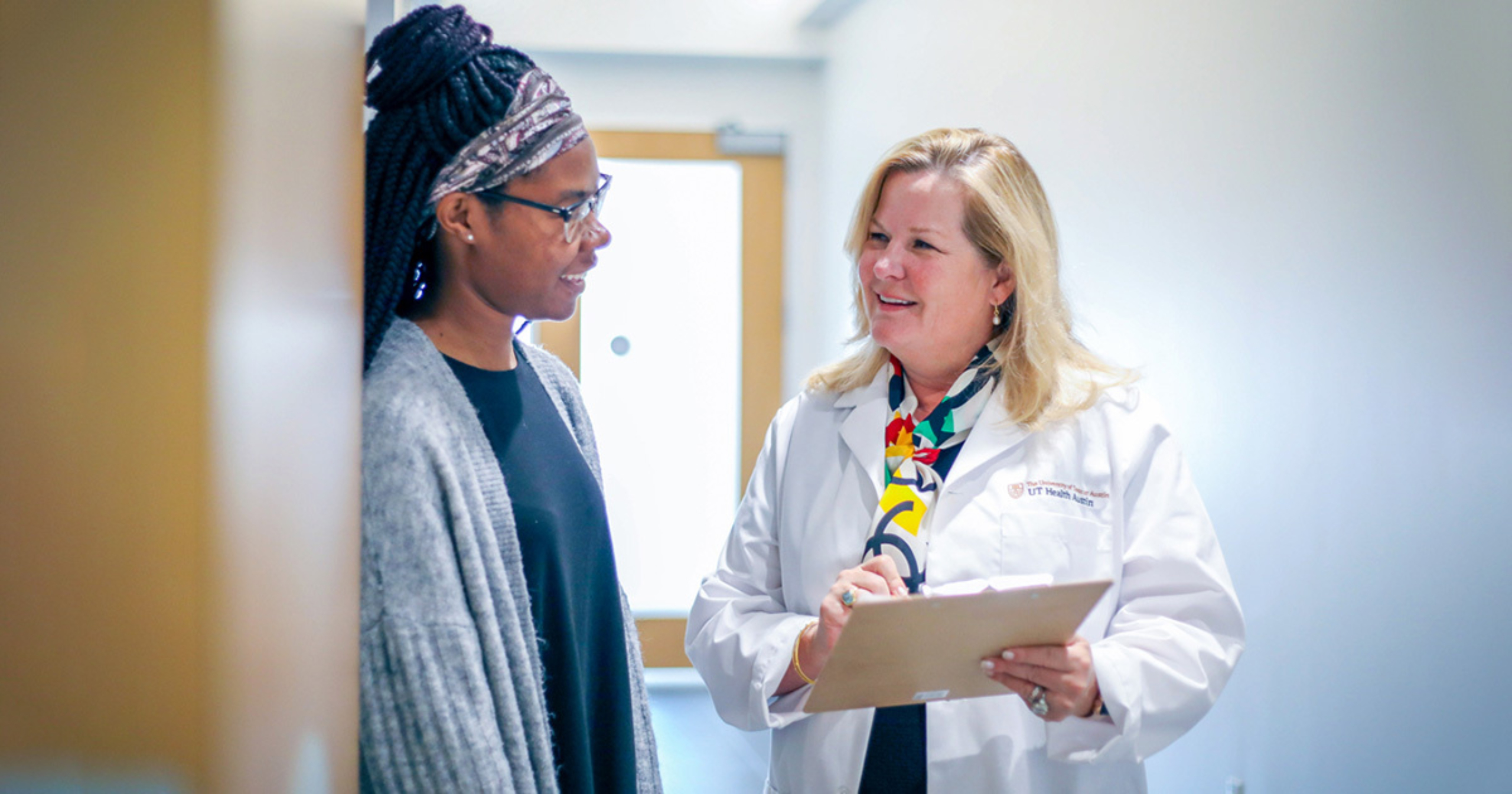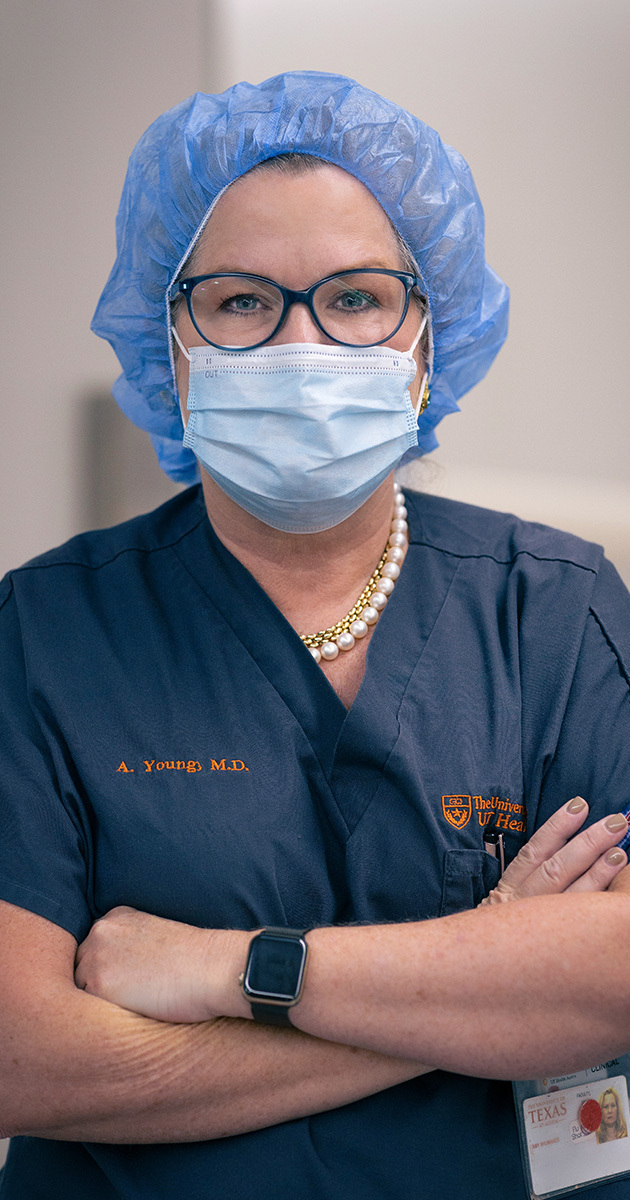Committed to Impact
Improving your health through the power of compassionate, whole-person care
Reviewed by: Amy Young, MD
Video by: Emily Kinsolving and Alyssa Martin
Written by: Ashley Lawrence
At UT Health Austin, our clinicians strive to create an environment of transformative healing by ensuring care delivery has a meaningful and lasting impact on patient health. Amy Young, MD, is a UT Health Austin obstetrician-gynecologist in Women’s Health, a clinical partnership between Ascension Seton and UT Health Austin. Dr. Young aims to improve your health by not only addressing your physical well-being, but also helping you achieve your personal, emotional, and mental health goals.
“Regardless of whether it’s in my one-on-one interactions with patients or in more indirect aspects of patient care, I always think about the impact that I’m making on particular individual and remind myself that this is someone’s mother, daughter, sister, or other loved one,” shares Dr. Young. “Treating patients with compassion is a powerful force that profoundly impacts patient care.”

Women’s Health provides comprehensive, specialized care for women at every stage of their lives. This includes access to routine obstetrical and gynecologic care, maternal-fetal medicine (high-risk obstetrical care), pelvic floor physical therapy, and subspecialty gynecologic services, including minimally invasive gynecologic surgery, gynecologic oncology, and urogynecology. Access to pediatric and adolescent gynecology services and comprehensive fetal care are also available through a clinical partnership between Dell Children’s Medical Center and UT Health Austin.
“Some of the conditions we treat are extremely uncommon, and there are gaps in the scientific consensus regarding how best to treat these patients,” explains Dr. Young. “At UT Health Austin, we have multidisciplinary care teams, meaning patients benefit from the expertise of multiple specialists across a variety of disciplines. Establishing effective communication between our care teams and other partners in the community helps us connect patients with resources and find answers to questions, which allows us to provide better care for the patient.”

Dr. Young was recently appointed the Executive Director for the American Board of Obstetrics & Gynecology, making her the first female to hold this role in its nearly 100-year history. Previously, she served as both the Vice Dean of Professional Practice for the Dell Medical School and the Chief Clinical Officer for UT Health Austin, where she was instrumental in navigating clinical operations during the COVID-19 pandemic.
“When I reflect on how far we’ve come since the COVID-19 pandemic, I feel quite proud,” says Dr. Young. “Despite facing the unknown, we were able to come together and create an infrastructure that met the needs of the community. It was a privilege to be a part of what we accomplished and makes me excited about the work we do to keep pushing medicine forward.”
At the emergence of the COVID-19 pandemic, Dr. Young helped transform the Health Center Garage into a drive-thru testing site and launch contact tracing efforts. When the Texas Department of State Health Services designated The University of Texas at Austin a COVID-19 Vaccination site, she also helped coordinate the arrival and distribution of the first coronavirus vaccine, launch an on-site vaccination clinic to help protect the health of the greater Austin community, and initiate a partnership with the School of Nursing to deploy mobile vaccination efforts to make vaccine more accessible to vulnerable populations and those in underserved communities.
“In an academic health environment, it isn’t all about practicing in the clinic. It’s also about moving forward in research,” explains Dr. Young. “One of the great things about academic medicine is that we’re constantly being challenged by patients, students, and the void of science. Being in such an environment drives intellectual curiosity, which has led to various clinical trials, a longitudinal ovarian cancer detection study, predictive modeling for obstetric patients, and more.”
In addition to her various leadership roles, Dr. Young is a professor in the Dell Medical School Department of Women’s Health, where she provides education and training for the next generation of obstetrician-gynecologists. She also served as the Interim Chair for the Dell Medical School Department of Diagnostic Medicine, which operates in partnership with local clinical practices and community physicians to redefine how diagnostic testing is designed, delivered, and leveraged to improve health for patients across the community.
“Creating an environment that stimulates curiosity has a multiplying effect,” continues Dr. Young. “It pushes providers, researchers, educators, and students to be the best that they can be for patients. It encourages us to rethink care delivery and, in turn, teaches the next generation of healthcare professionals to go out into the community and continue to ask questions and design and deliver care in novel ways.”